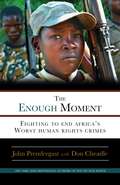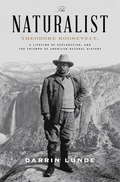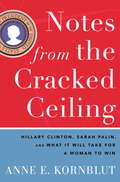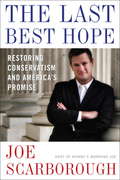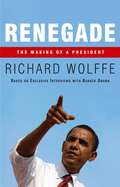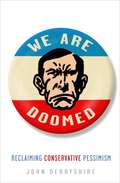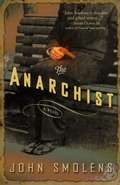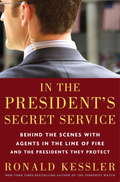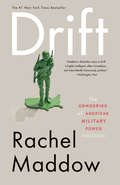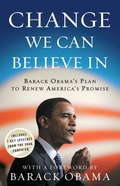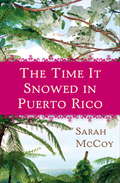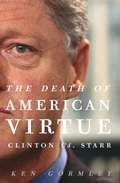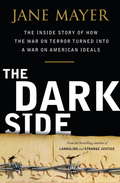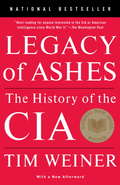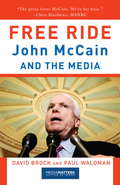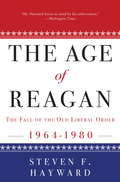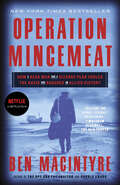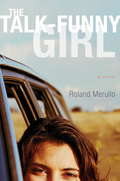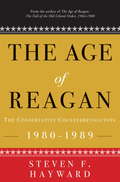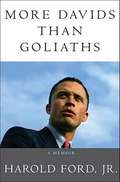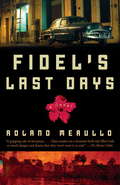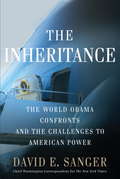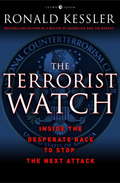- Table View
- List View
The Enough Moment: Fighting to End Africa's Worst Human Rights Crimes
by Don Cheadle John PrendergastHad Enough? Join activists, organizations, and celebrities to fight human rights crimes in Africa.Human rights activist John Prendergast and Oscar-nominated actor Don Cheadle bring us an empowering and hopeful new book, as they reveal the steps being taken by engaged citizens--"Upstanders"--famous and unknown, here and abroad, to combat genocide, rape, and child soldierdom in Africa, and show how you can be a part of the movement.Learn how a high school student in Chicago rallied fellow students all over his city to raise awareness of genocide... a former child soldier in Uganda formed a group of others like him to aid in reconciliation... and a mother and teacher gang-raped by soldiers in Congo found strength to help other survivors. John and Don present ways for you to form alliances, contact Congress, alert the media, enlist corporations, and use social media to become part of the solution.Featuring testimonies and interviews with:* Ben Affleck * Madeleine Albright * Emmanuelle Chriqui * Sheryl Crow * Ann Curry * Annie Duke * Dave Eggers * Mia Farrow * Ryan Gosling * Mariska Hargitay * Emile Hirsch * Iman * Angelina Jolie * Nicholas Kristof * Joel Madden * Nicole Richie * Martin Sheen * Robin Wright * As well as a number of members of Congress and many others making a differenceFrom the Trade Paperback edition.
The Naturalist: Theodore Roosevelt, A Lifetime of Exploration, and the Triumph of American Natural History
by Darrin LundeA captivating new account of how Theodore Roosevelt’s lifelong passion for the natural world set the stage for America’s wildlife conservation movement and determined his legacy as a founding father of today’s museum naturalism No U.S. president is more popularly associated with nature and wildlife than is Theodore Roosevelt—prodigious hunter, tireless adventurer, and ardent conservationist. We think of him as a larger-than-life original, yet in The Naturalist, Darrin Lunde has firmly situated Roosevelt’s indomitable curiosity about the natural world in the tradition of museum naturalism. As a child, Roosevelt actively modeled himself on the men (including John James Audubon and Spencer F. Baird) who pioneered this key branch of biology by developing a taxonomy of the natural world—basing their work on the experiential study of nature. The impact that these scientists and their trailblazing methods had on Roosevelt shaped not only his audacious personality but his entire career, informing his work as a statesman and ultimately affecting generations of Americans’ relationship to this country’s wilderness. Drawing on Roosevelt’s diaries and travel journals as well as Lunde’s own role as a leading figure in museum naturalism today, The Naturalist reads Roosevelt through the lens of his love for nature. From his teenage collections of birds and small mammals to his time at Harvard and political rise, Roosevelt’s fascination with wildlife and exploration culminated in his triumphant expedition to Africa, a trip which he himself considered to be the apex of his varied life. With narrative verve, Lunde brings his singular experience to bear on our twenty-sixth president’s life and constructs a perceptively researched and insightful history that tracks Roosevelt’s maturation from exuberant boyhood hunter to vital champion of serious scientific inquiry.From the Hardcover edition.
Notes from the Cracked Ceiling: Hillary Clinton, Sarah Palin, and What It Will Take for a Woman to Win
by Anne E. KornblutIn the presidential election of 2008 America seemed ready to elevate a woman to the presidency or vice presidency and-with Hillary Clinton and Sarah Palin-was on the verge of actually doing so. Words like inevitable and phenomenon were in the air and the political and cultural stars seemed to be aligned. Why didn't it happen? What will it take to make it happen soon? In a probing analysis sure to ignite controversy, acclaimed White House correspondent Anne Kornblut argues that the optimists are blind to formidable obstacles that still stand in the way of any woman who aims for America's highest political offices. And she makes clear exactly which strategies and common assumptions will need to change if a woman intends to break through the "highest, hardest glass ceiling" of all. Delving deep inside the Clinton and Palin campaigns, Kornblut reveals: * the strategists' mishandling of their candidates as women by failing to strike the right balance between femininity and toughness * Clinton's weathering of a series of stinging gender-based attacks, until accusations of "pimping out" her daughter, Chelsea, finally brought her to tears * that Barack Obama was celebrated for his "historic" win in Iowa, even though it was not the first time an African American had won a caucus, but few noticed when Clinton became the first woman to win a primary in New Hampshire * that Palin was chosen solely by men, none of whom had experience in running women for office. Drawing from exclusive interviews with prominent women in both parties, Kornblut pinpoints where politically ambitious American women have gone wrong and what it will take to put them on track to the ultimate prize: the presidency. Former secretary of state Condoleezza Rice asserts: "We crossed the bar on African Americans some time ago. I'm not quite sure we've crossed it on women. " House Speaker Nancy Pelosi remarks on the "suit of armor" women must don to survive the sexism and viciousness of politics. Homeland Security Director Janet Napolitano confronts the false rumors that she is a lesbian and reveals what an invigorating "kick in the pants" it is to be in politics. And California gubernatorial candidate Meg Whitman, the former head of eBay, compares politics to business: "It feels to me, thus far, as less of a meritocracy and more of a popularity contest. More of a little bit of an old boys' club. " Kornblut identifies the surprising realities of gender politics, such as the harsh treatment female candidates often receive from women voters, the gap between the United States and other countries when it comes to the electability of women, the "mommy penalty" that handicaps women candidates with young children, and the special appeal that women with law enforcement backgrounds have with voters. Notes from the Cracked Ceiling reveals that the highly touted new era of gender-equal politics never got as far as was commonly perceived and is now in full retreat. It is essential reading for anyone who cares about politics and the limits for women that persist.
The Last Best Hope: Restoring Conservatism and America's Promise
by Joe ScarboroughIn this groundbreaking book, Joe Scarborough tells Republican Party bosses what they don't want to hear, explains why Democrats are making matters so much worse, and then shows leaders of both parties the way forward.
Renegade: The Making of a President
by Richard WolffeBefore the White House and Air Force One, before the TV ads and the enormous rallies, there was the real Barack Obama: a man wrestling with the momentous decision to run for the presidency, feeling torn about leaving behind a young family, and figuring out how to win the biggest prize in politics.This book is the previously untold and epic story of how a political newcomer with no money and an alien name grew into the world's most powerful leader. But it is also a uniquely intimate portrait of the person behind the iconic posters and the Secret Service code name Renegade. Drawing on a dozen unplugged interviews with the candidate and president, as well as twenty-one months covering his campaign as it traveled from coast to coast, Richard Wolffe answers the simple yet enduring question about Barack Obama: Who is he? Based on Wolffe's unprecedented access to Obama, Renegade reveals the making of a president, both on the campaign trail and before he ran for high office. It explains how the politician who emerged in an extraordinary election learned the personal and political skills to succeed during his youth and early career. With cool self-discipline, calculated risk taking, and simple storytelling, Obama developed the strategies he would need to survive the onslaught of the Clintons and John McCain, and build a multimillion-dollar machine to win a historic contest.In Renegade, Richard Wolffe shares with us his front-row seat at Obama's announcement to run for president on a frigid day in Springfield, and his victory speech on a warm night in Chicago. We fly on the candidate's plane and ride in his bus on an odyssey across a country in crisis; stand next to him at a bar on the night he secures the nomination; and are backstage as he delivers his convention speech to a stadium crowd and a transfixed national audience. From a teacher's office in Iowa to the Oval Office in Washington, we see and hear Barack Obama with an immediacy and honesty never witnessed before. Renegade provides not only an account of Obama's triumphs, but also examines his many personal and political trials. We see Obama wrestling with race and politics, as well as his former pastor Reverend Jeremiah Wright. We see him struggling with life as a presidential candidate, a campaign that falters for most of its first year, and his reaction to a surprise defeat in the New Hampshire primary. And we see him relying on his personal experience, as well as meticulous polling, to pass the presidential test in foreign and economic affairs. Renegade is an essential guide to understanding President Barack Obama and his trusted inner circle of aides and friends. It is also a riveting and enlightening first draft of history and political psychology.From the Hardcover edition.
We Are Doomed: Reclaiming Conservative Pessimism
by John DerbyshireTo his fellow conservatives, John Derbyshire makes a plea: Don’t be seduced by this nonsense about "the politics of hope. " Skepticism, pessimism, and suspicion of happy talk are the true characteristics of an authentically conservative temperament. And from Hobbes and Burke through Lord Salisbury and Calvin Coolidge, up to Pat Buchanan and Mark Steyn in our own time, these beliefs have kept the human race from blindly chasing its utopian dreams right off a cliff. Recently, though, various comforting yet fundamentally idiotic notions of political correctness and wishful thinking have taken root beyond the "Kumbaya"-singing, we’re-all-one crowd. These ideas have now infected conservatives, the very people who really should know better. The Republican Party has been derailed by legions of fools and poseurs wearing smiley-face masks. Think rescuing the economy by condemning our descendents to lives of spirit-crushing debt. Think nation-building abroad while we slowly disintegrate at home. Think education and No Child Left Behind. . . . But don’t think about it too much, because if you do, you’ll quickly come to the logical conclusion: We are doomed. Need more convincing? Dwell on the cheerful promises of the diversity cult and the undeniable reality of the oncoming demographic disaster. Contemplate the feminization of everything, or take a good look at what passes for art these days. Witness the rise of culturism and the death of religion. Bow down before your new master, the federal apparatchik. Finally, ask yourself: How certain am I that the United States of America will survive, in any recognizable form, until, say, 2022? A scathing, mordantly funny romp through today’s dismal and dismaler political and cultural scene,We Are Doomedprovides a long-overdue dose of reality, revealing just how the GOP has been led astray in recent years–and showing that had conservatives held on to their fittingly pessimistic outlook, America’s future would be far brighter. Ladies and gentlemen, it’s time to embrace the Audacity of Hopelessness.
The Anarchist: A Novel
by John SmolensOn a stifling, hot afternoon in September 1901, a young anarchist, Leon Czolgosz, who has been stalking President William McKinley, waits in line to meet the president, his right hand wrapped in a handkerchief and held across his chest as though it were in a sling. But the handkerchief conceals a .32-caliber revolver. When the president greets him, Czolgosz fires two shots. The nation quickly plummets into fear and anger. A week later, rioting mobs attempt to lynch McKinley's assassin, and across the country, political dissidents such as the notorious Emma Goldman are tracked down and arrested. Driven by a sense of duty and by his love for a beautiful Russian prostitute, Czolgosz's confidant, Moses Hyde, infiltrates an anarchist group as it sets in motion a deadly scheme designed to push the country into a state of terror. The Anarchist brilliantly renders a haunting and belligerent twentieth-century landscape teeming with corrupt politicians, kind-hearted prostitutes, dissidents, and immigrants eager for a fresh start. It is an America where every allegiance is questioned, and every hope and aspiration comes at a price.
In the President's Secret Service: Behind the Scenes with Agents in the Line of Fire and the Presidents They Protect
by Ronald KesslerNever before has a journalist penetrated the wall of secrecy that surrounds the U.S. Secret Service, that elite corps of agents who pledge to take a bullet to protect the president and his family. After conducting exclusive interviews with more than one hundred current and former Secret Service agents, bestselling author and award-winning reporter Ronald Kessler reveals their secrets for the first time.Secret Service agents, acting as human surveillance cameras, observe everything that goes on behind the scenes in the president's inner circle. Kessler reveals what they have seen, providing startling, previously untold stories about the presidents, from John F. Kennedy and Lyndon Johnson to George W. Bush and Barack Obama, as well as about their families, Cabinet officers, and White House aides. Kessler portrays the dangers that agents face and how they carry out their missions-from how they are trained to how they spot and assess potential threats. With fly-on-the-wall perspective, he captures the drama and tension that characterize agents' lives.In this headline-grabbing book, Kessler discloses assassination attempts that have never before been revealed. He shares inside accounts of past assaults that have put the Secret Service to the test, including a heroic gun battle that took down the would-be assassins of Harry S. Truman, the devastating day that John F. Kennedy was killed in Dallas, and the swift actions that saved Ronald Reagan after he was shot.While Secret Service agents are brave and dedicated, Kessler exposes how Secret Service management in recent years has betrayed its mission by cutting corners, risking the assassination of President Barack Obama, Vice President Joe Biden, and their families. Given the lax standards, "It's a miracle we have not had a successful assassination," a current agent says.Since an assassination jeopardizes democracy itself, few agencies are as important as the Secret Service-nor is any other subject as tantalizing as the inner sanctum of the White House. Only tight-lipped Secret Service agents know the real story, and Ronald Kessler is the only journalist to have won their trust.From the Hardcover edition.
Drift
by Rachel MaddowThe #1 New York Times bestseller that charts America's dangerous drift into a state of perpetual war. "One of my favorite ideas is, never to keep an unnecessary soldier," Thomas Jefferson wrote in 1792. Neither Jefferson nor the other Founders could ever have envisioned the modern national security state, with its tens of thousands of "privateers"; its bloated Department of Homeland Security; its rusting nuclear weapons, ill-maintained and difficult to dismantle; and its strange fascination with an unproven counterinsurgency doctrine. Written with bracing wit and intelligence, Rachel Maddow's Drift argues that we've drifted away from America's original ideals and become a nation weirdly at peace with perpetual war, with all the financial and human costs that entails. To understand how we've arrived at such a dangerous place, Maddow takes us from the Vietnam War to today's war in Afghanistan, along the way exploring the disturbing rise of executive authority, the gradual outsourcing of our war-making capabilities to private companies, the plummeting percentage of American families whose children fight our constant wars for us, and even the changing fortunes of G.I. Joe. She offers up a fresh, unsparing appraisal of Reagan's radical presidency. Ultimately, she shows us just how much we stand to lose by allowing the priorities of the national security state to overpower our political discourse. Sensible yet provocative, dead serious yet seriously funny, Drift will reinvigorate a "loud and jangly" political debate about how, when, and where to apply America's strength and power--and who gets to make those decisions.From the Hardcover edition.
Drift: The Unmooring of American Military Power (Playaway Adult Nonfiction Ser.)
by Rachel MaddowThe #1 New York Times bestseller that charts America’s dangerous drift into a state of perpetual war. Written with bracing wit and intelligence, Rachel Maddow's Drift argues that we've drifted away from America's original ideals and become a nation weirdly at peace with perpetual war. To understand how we've arrived at such a dangerous place, Maddow takes us from the Vietnam War to today's war in Afghanistan, along the way exploring Reagan's radical presidency, the disturbing rise of executive authority, the gradual outsourcing of our war-making capabilities to private companies, the plummeting percentage of American families whose children fight our constant wars for us, and even the changing fortunes of G.I. Joe. Ultimately, she shows us just how much we stand to lose by allowing the scope of American military power to overpower our political discourse. Sensible yet provocative, dead serious yet seriously funny, Drift will reinvigorate a "loud and jangly" political debate about our vast and confounding national security state.
Change We Can Believe In: Barack Obama's Plan to Renew America's Promise
by Barack ObamaThe election of Barack Obama as President of the USA is a defining moment for all of us. After years of failed policies and a failed politics from Washington, change has arrived. Barack Obama now has the chance to reclaim the American dream. He has proven to be a new kind of leaderâ "one who can bring people together, be honest about the challenges we all face, and move his nation forward. Change We Can Believe In outlines his vision for America and its standing in the world. In these pages you will find bold and specific ideas about how Barack Obama plans to fix the ailing American economy and strengthen its middle class, make health care affordable for all, achieve energy independence, and keep America safe in a dangerous world. Change We Can Believe In asks us not just to believe in Barack Obama's ability to bring change to Washington, it asks us to believe in the ability of each of us to change the world.
The Time It Snowed in Puerto Rico: A Novel
by Sarah MccoyVerdita Ortiz-Santiago has spent 11 long years in her sleepy Puerto Rican mountain town, and she is desperate for change. For her, the choice is easy--move to the States. McCoy's work delves into the conflicting feelings people have for those they love and the difficulties of leaving one's homeland for places unknown.
The Death of American Virtue: Clinton vs. Starr
by Ken GormleyTen years after one of the most polarizing political scandals in American history, author Ken Gormley offers an insightful, balanced, and revealing analysis of the events leading up to the impeachment trial of President William Jefferson Clinton. From Ken Starr's initial Whitewater investigation through the Paula Jones sexual harassment suit to the Monica Lewinsky affair, The Death of American Virtue is a gripping chronicle of an ever-escalating political feeding frenzy.In exclusive interviews, Bill Clinton, Ken Starr, Monica Lewinsky, Paula Jones, Susan McDougal, and many more key players offer candid reflections on that period. Drawing on never-before-released records and documents--including the Justice Department's internal investigation into Starr, new details concerning the death of Vince Foster, and evidence from lawyers on both sides--Gormley sheds new light on a dark and divisive chapter, the aftereffects of which are still being felt in today's political climate.From the Hardcover edition.
The Dark Side: The Inside Story of How the War on Terror Turned into a War on American Ideals
by Jane Mayer<P>A dramatic and damning narrative account of how America has fought the "War on Terror." In the days immediately following September 11th, the most powerful people in the country were panic-stricken. The radical decisions about how to combat terrorists and strengthen national security were made in a state of utter chaos and fear, but the key players, Vice President Dick Cheney and his powerful, secretive adviser David Addington, used the crisis to further a long held agenda to enhance Presidential powers to a degree never known in U.S. history, and obliterate Constitutional protections that define the very essence of the American experiment. <P>THE DARK SIDE is a dramatic, riveting, and definitive narrative account of how the United States made terrible decisions in the pursuit of terrorists around the world-- decisions that not only violated the Constitution to which White House officials took an oath to uphold, but also hampered the pursuit of Al Qaeda. In gripping detail, acclaimed New Yorker writer and bestselling author, Jane Mayer, relates the impact of these decisions--U.S.-held prisoners, some of them completely innocent, were subjected to treatment more reminiscent of the Spanish Inquisition than the twenty-first century. <P>THE DARK SIDE will chronicle real, specific cases, shown in real time against the larger tableau of what was happening in Washington, looking at the intelligence gained--or not--and the price paid. In some instances, torture worked. In many more, it led to false information, sometimes with devastating results. For instance, there is the stunning admission of one of the detainees, Sheikh Ibn al-Libi, that the confession he gave under duress--which provided a key piece of evidence buttressing congressional support of going to war against Iraq--was in fact fabricated, to make the torture stop. In all cases, whatever the short term gains, there were incalculable losses in terms of moral standing, and our country's place in the world, and its sense of itself. <P>THE DARK SIDE chronicles one of the most disturbing chapters in American history, one that will serve as the lasting legacy of the George W. Bush presidency.
Legacy of Ashes: The History of the CIA
by Tim WeinerWith shocking revelations that made headlines in papers across the country, Pulitzer-Prize-winner Tim Weiner gets at the truth behind the CIA and uncovers here why nearly every CIA Director has left the agency in worse shape than when he found it; and how these profound failures jeopardize our national security.
Free Ride: John McCain and the Media
by David Brock Paul WaldmanWe live in a gotcha media culture that revels in exposing the foibles and hypocrisies of our politicians. But one politician manages to escape this treatment, getting the benefit of the doubt and a positive spin for nearly everything he does: John McCain. Indeed, even during his temporary decline in popularity in 2007, the media continued to support him by lamenting his fate rather than criticizing the flip flops and politicking that undermined his popular image as a maverick. David Brock and Paul Waldman show how the media has enabled McCain's rise from the Keating Five scandal to the underdog hero of the 2000 primaries to his roller-coaster run for the 2008 nomination. They illuminate how the press falls for McCain's "straight talk" and how the Arizona senator gets away with inconsistencies and misrepresentations for which the media skewers other politicians. This is a fascinating study of how the media shape the political debate, and an essential book for every political junkie.
The Age of Reagan: The Fall of the Old Liberal Order, 1964-1980
by Steven F. HaywardThe Age of Reagan brings to life the tumultuous decade and a half that preceded Ronald Reagan's ascent to the White House. Drawing on scores of interviews and years of research, Steven F. Hayward takes us on an engrossing journey through the most politically divisive years the United States has had to endure since the decade before the Civil War. Hayward captures an America at war with itself--and an era whose reverberations we feel to this very day. He brings new insight into the profound failure of Lyndon Johnson's Great Society, the oddly liberal nature of Richard Nixon's administration, the significance of Reagan's years as California's governor, the sudden-death drama of his near defeat of Gerald Ford in the 1976 Republican primary, the listlessness of Jimmy Carter's leadership, and the political earthquake that was Reagan's victorious presidential campaign in 1980. Provocative, authoritative, and majestic in scope, The Age of Reagan is an unforgettable account of the rebirth and triumph of the American spirit.
Operation Mincemeat: How a Dead Man and a Bizarre Plan Fooled the Nazis and Assured an Allied Victory
by Ben MacintyreNEW YORK TIMES BESTSELLER • NOW A NETFLIX FILM STARRING COLIN FIRTH • The &“brilliant and almost absurdly entertaining&” (Malcolm Gladwell, The New Yorker) true story of the most successful—and certainly the strangest—deception carried out in World War II, from the acclaimed author of The Spy and the Traitor &“Pure catnip to fans of World War II thrillers and a lot of fun for everyone else.&”—Joseph Kanon, The Washington Post Book WorldNear the end of World War II, two British naval officers came up with a brilliant and slightly mad scheme to mislead the Nazi armies about where the Allies would attack southern Europe. To carry out the plan, they would have to rely on the most unlikely of secret agents: a dead man.Ben Macintyre&’s dazzling, critically acclaimed bestseller chronicles the extraordinary story of what happened after British officials planted this dead body—outfitted in a British military uniform with a briefcase containing false intelligence documents—in Nazi territory, and how this secret mission fooled Hitler into changing military positioning, paving the way for the Allies&’ drive to victory. NAMED ONE OF THE BEST BOOKS OF THE YEAR BY THE NEW YORK TIMES
The Talk-Funny Girl
by Roland MerulloIn one of the poorest parts of rural New Hampshire, teenage girls have been disappearing, snatched from back country roads, never to be seen alive again. For seventeen-year-old Marjorie Richards, the fear raised by these abductions is the backdrop to what she lives with her own home, every day. Marjorie has been raised by parents so intentionally isolated from normal society that they have developed their own dialect, a kind of mountain hybrid of English that displays both their ignorance of and disdain for the wider world. Marjorie is tormented by her classmates, who call her "The Talk-funny girl," but as the nearby factory town sinks deeper into economic ruin and as her parents fall more completely under the influence of a sadistic cult leader, her options for escape dwindle. But then, thanks to a loving aunt, Marjorie is hired by a man, himself a victim of abuse, who is building what he calls "a cathedral," right in the center of town. Day by day, Marjorie's skills as a stoneworker increase, and so too does her intolerance for the bitter rules of her family life. Gradually, through exposure to the world beyond her parents' wood cabin thanks to the kindness of her aunt and her boss, and an almost superhuman determination, she discovers what is loveable within herself. This newfound confidence and self-esteem ultimately allows her to break free from the bleak life she has known, to find love, to start a family, and to try to heal her old, deep wounds without passing that pain on to her husband and children. By turns darkly menacing and bright with love and resilience, The Talk-Funny Girl is the story of one young woman's remarkable courage, a kind of road map for the healing of early abuse, and a testament to the power of kindness and love. From the Hardcover edition.
The Age of Reagan: The Conservative Counterrevolution 1980-1989
by Steven F. Hayward“Those who say that we’re in a time when there are no heroes, they just don’t know where to look. ” –President Ronald Reagan, January 20, 1981 Hero. It was a word most Americans weren’t using much in 1980. As they waited on gas and unemployment lines, as their enemies abroad grew ever more aggressive, and as one after another their leaders failed them, Americans began to believe the country’s greatness was fading. Yet within two years the recession and gas shortage were over. Before the decade was out, the Cold War was won, the Berlin Wall came crashing down, and America was once more at the height of prosperity. And the nation had a new hero: Ronald Wilson Reagan. Reagan’s greatness is today widely acknowledged, but his legacy is still misunderstood. Democrats accept the effectiveness of his foreign policy but ignore the success of his domestic programs; Republicans cheer his victories over liberalism while ignoring his bitter battles with his own party’s establishment; historians speak of his eloquence and charisma but gloss over his brilliance in policy and clarity of vision. From Steven F. Hayward, the critically acclaimed author ofThe Age of Reagan: The Fall of the Old Liberal Order, comes the first complete, true story of this misunderstood, controversial, and deeply consequential presidency. Hayward pierces the myths and media narratives, masterfully documenting exactly what transpired behind the scenes during Reagan’s landmark presidency and revealing his real legacy. What emerges is a compelling portrait of a man who arrived in office after thirty years of practical schooling in the ways of politics and power, possessing a clear vision of where he wanted to take the nation and a willingness to take firm charge of his own administration. His relentless drive to shrink government and lift the burdens of high taxation was born of a deep appreciation for the grander blessings of liberty. And it was this same outlook, extended to the world’s politically and economically enslaved nations, that shaped his foreign policy and lent his statecraft its great unifying power. Over a decade in the making, and filled with fresh revelations, surprising insights, and an unerring eye for the telling detail, this provocative and authoritative book recalls a time when true leadership inspired a fallen nation to pick itself up, hold its head high, and take up the cause of freedom once again.
More Davids Than Goliaths: A Political Education
by Harold Ford Jr.Harold Ford Jr. has long distinguished himself as a charismatic, results-oriented politician with fresh ideas. His career began at age 26 after he won his father's Congressional seat, serving his Tennessee district for ten years. He stepped into the national spotlight with his electric keynote at the 2000 Democratic National Convention, and in 2006 his reputation was further shaped during the closest Senate race in Tennessee's history, which he lost. Ford feels passionately that our country's best da...
Fidel's Last Days
by Roland MerulloRoland Merullo has consistently wowed critics with his brilliant storytelling and his refusal to be pigeonholed, hopscotching from the coming-of-age tale (In Revere, In Those Days) to the novel-as-fable (Golfing with God) to the road trip genre (Breakfast with Buddha). Now Merullo delivers a dazzling and finely nuanced political thriller about a clandestine plot to assassinate Cuban dictator Fidel Castro. Former CIA agent Carolina Perez has spent five years working deep undercover with a singular goal: to take down Castro and free Cuba from his troubled presence. Recruited by a powerful shadow organization known as the White Orchid, steely and sexy Carolina has passed test after test to prove herself ready for the ultimate assignment. Convinced of the rightness of her cause, she will do anything to complete her mission. That includes duping her uncle Roberto Anzar, a wealthy and influential player in Miami's Cuban American community. But when suspicious details raise questions about her mysterious employer, not even Carolina is prepared for the elaborate web of deceit that surrounds her. Across the Straits of Florida, Carlos Gutierrez has been lured into playing a pivotal role in the plot to overthrow el Comandante. The minister of health and a member of Castro's inner circle, Carlos has grown disenchanted with a political system that pays lip service to the Revolution's egalitarian ideals while ruling the country with ruthlessness, corruption, and lies. As his involvement deepens at great risk to himself and those he loves, the doctor who has dedicated his career to saving lives must decide how much blood he is willing to have on his own hands in the name of freedom. For both Carlos and Carolina, the threat of betrayal looms large. Who can be trusted in a byzantine network of spies, double agents, and informants? Is the plot real or is it an elaborate ruse to expose the underground dissidents in Cuba? From the sizzling opulence of Miami to the paranoid dreamscape of Havana,Fidel's Last Daysis a dizzying ride by a novelist whose genre-crossing talents know no bounds. From the Hardcover edition.
Fidel’s Last Days
by Roland MerulloRoland Merullo has consistently wowed critics with his brilliant storytelling and his refusal to be pigeonholed, hopscotching from the coming-of-age tale (In Revere, In Those Days) to the novel-as-fable (Golfing with God) to the road trip genre (Breakfast with Buddha). Now Merullo delivers a dazzling and finely nuanced political thriller about a clandestine plot to assassinate Cuban dictator Fidel Castro. Former CIA agent Carolina Perez has spent five years working deep undercover with a singular goal: to take down Castro and free Cuba from his troubled presence. Recruited by a powerful shadow organization known as the White Orchid, steely and sexy Carolina has passed test after test to prove herself ready for the ultimate assignment. Convinced of the rightness of her cause, she will do anything to complete her mission. That includes duping her uncle Roberto Anzar, a wealthy and influential player in Miami’s Cuban American community. But when suspicious details raise questions about her mysterious employer, not even Carolina is prepared for the elaborate web of deceit that surrounds her. Across the Straits of Florida, Carlos Gutierrez has been lured into playing a pivotal role in the plot to overthrow el Comandante. The minister of health and a member of Castro’s inner circle, Carlos has grown disenchanted with a political system that pays lip service to the Revolution’s egalitarian ideals while ruling the country with ruthlessness, corruption, and lies. As his involvement deepens at great risk to himself and those he loves, the doctor who has dedicated his career to saving lives must decide how much blood he is willing to have on his own hands in the name of freedom. For both Carlos and Carolina, the threat of betrayal looms large. Who can be trusted in a byzantine network of spies, double agents, and informants? Is the plot real or is it an elaborate ruse to expose the underground dissidents in Cuba? From the sizzling opulence of Miami to the paranoid dreamscape of Havana, Fidel’s Last Days is a dizzying ride by a novelist whose genre-crossing talents know no bounds.
The Inheritance: The World Obama Confronts and the Challenges to American Power
by David E. SangerReaders of The New York Times know David Sanger as one of the most trusted correspondents in Washington, one to whom presidents, secretaries of state, and foreign leaders talk with unusual candor. Now, with a historian’s sweep and an insider’s eye for telling detail, Sanger delivers an urgent intelligence briefing on the world America faces. In a riveting narrative, The Inheritance describes the huge costs of distraction and lost opportunities at home and abroad as Iraq soaked up manpower, money, and intelligence capabilities. The 2008 market collapse further undermined American leadership, leaving the new president with a set of challenges unparalleled since Franklin D. Roosevelt entered the Oval Office.Sanger takes readers into the White House Situation Room to reveal how Washington penetrated Tehran’s nuclear secrets, leading President Bush, in his last year, to secretly step up covert actions in a desperate effort to delay an Iranian bomb. Meanwhile, his intelligence chiefs made repeated secret missions to Pakistan as they tried to stem a growing insurgency and cope with an ally who was also aiding the enemy–while receiving billions in American military aid. Now the new president faces critical choices: Is it better to learn to live with a nuclear Iran or risk overt or covert confrontation? Is it worth sending U.S. forces deep into Pakistani territory at the risk of undermining an unstable Pakistani government sitting on a nuclear arsenal? It is a race against time and against a new effort by Islamic extremists–never before disclosed–to quietly infiltrate Pakistan’s nuclear weapons program. “Bush wrote a lot of checks,” one senior intelligence official told Sanger, “that the next president is going to have to cash.”The Inheritance takes readers to Afghanistan, where Bush never delivered on his promises for a Marshall Plan to rebuild the country, paving the way for the Taliban’s return. It examines the chilling calculus of North Korea’s Kim Jong-Il, who built actual weapons of mass destruction in the same months that the Bush administration pursued phantoms in Iraq, then sold his nuclear technology in the Middle East in an operation the American intelligence apparatus missed. And it explores how China became one of the real winners of the Iraq war, using the past eight years to expand its influence in Asia, and lock up oil supplies in Africa while Washington was bogged down in the Middle East. Yet Sanger, a former foreign correspondent in Asia, sees enormous potential for the next administration to forge a partnership with Beijing on energy and the environment. At once a secret history of our foreign policy misadventures and a lucid explanation of the opportunities they create, The Inheritance is vital reading for anyone trying to understand the extraordinary challenges that lie ahead.
The Terrorist Watch: Inside the Desperate Race to Stop the Next Attack
by Ronald KesslerBased almost entirely on sources within the Federal Bureau of Investigation and the Central Intelligence Agency--prominently including FBI Director Mueller, CIA Director Hayden, and White House Counterterrorism Chief Townsend--this work by Kessler (chief Washington correspondent for NewsMax.com), aimed at a general audience, is an entirely one-sided and hagiographic account of US government counterterrorism operations in the wake of the September 11th attacks. Describing the activities of his heroic FBI and CIA agents, Kessler not infrequently descends outright into cynical apologia. To cite but one example, torture is mentioned exactly three times in the book, twice to claim that the CIA never engages in such practices, although it is admitted that they do employ sleep deprivation and stress positions, techniques considered by many reputable experts to be torture, and once to dismiss any concerns about the so-called "extraordinary rendition" program, which often hands American-held detainees over to countries that routinely employ torture for interrogation. "Why should the U.S. give them a safe haven from the laws and practices of their own countries?" asks Kessler. Annotation ©2008 Book News, Inc., Portland, OR (booknews.com)
